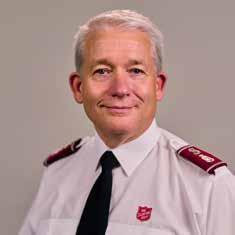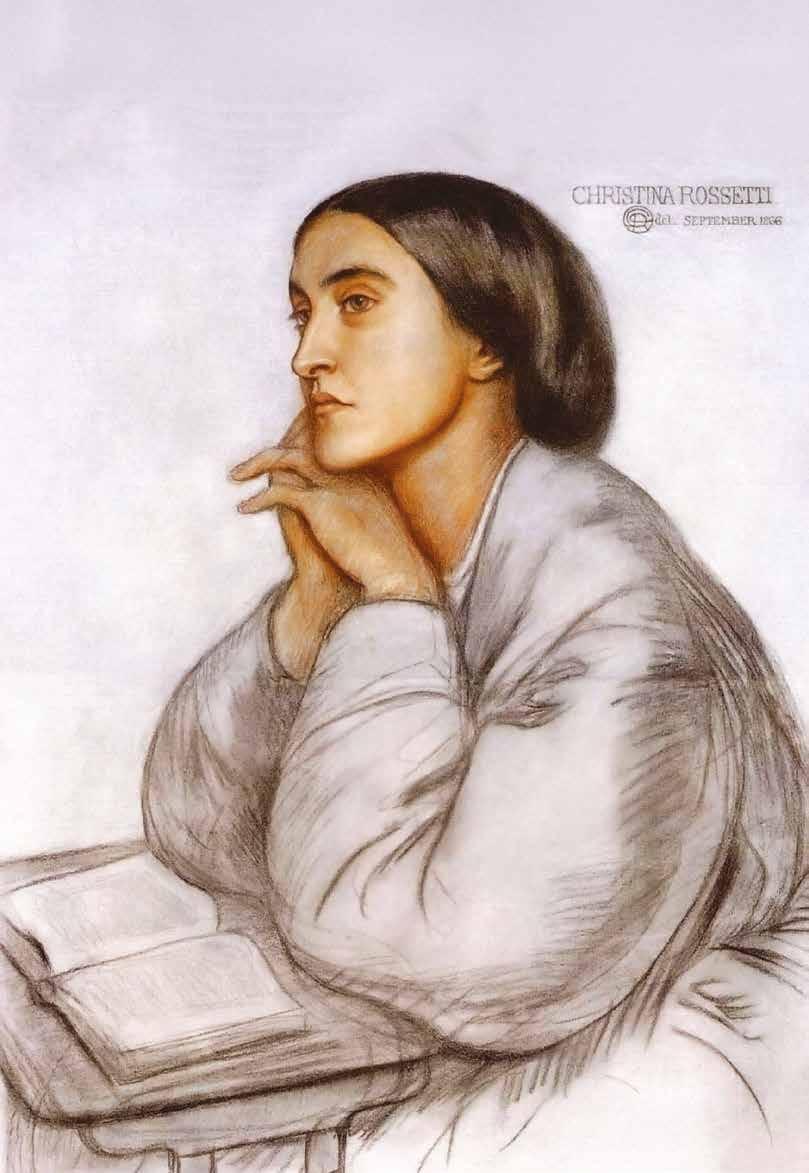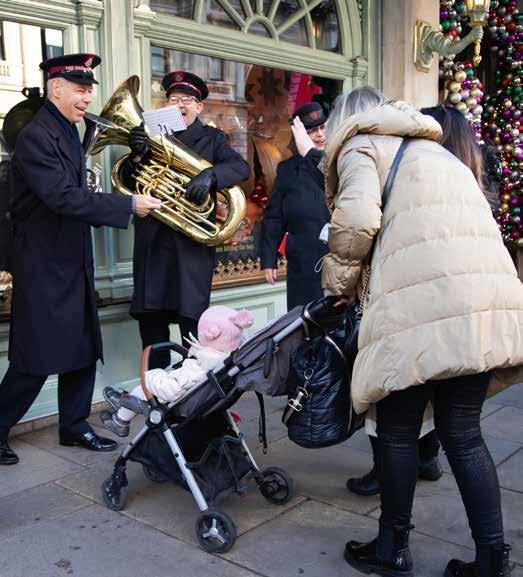
How love is being shared at Christmas It’s a gift


How love is being shared at Christmas It’s a gift
The Salvation Army is a Christian church and registered charity seeking to share the good news of Jesus and nurture committed followers of him. We also serve people without discrimination, care for creation and seek justice and reconciliation. We offer practical support and services in more than 700 centres throughout the UK. Go to salvationarmy.org.uk/find-a-church to find your nearest centre.
The Salvation Army first published a newspaper called the War Cry in London in December 1879, and we have continued to appear every week since then. Our name refers to our battle for people’s hearts and souls as we promote the positive impact of the Christian faith and The Salvation Army’s fight for greater social justice.
Editor: Andrew Stone, Major
Managing Editor: Philip Halcrow
Staff Writer: Emily Bright
Staff Writer: Claire Brine
Staff Writer: Ewan Hall
Editorial Assistant: Linda McTurk
Graphic Designer: Mark Knight
Graphic Designer: Natalie Adkins
Email: warcry@salvationarmy.org.uk
The Salvation Army
United Kingdom and Ireland Territory
1 Champion Park London SE5 8FJ
Tel: 0845 634 0101
Subscriptions: 01933 445445 (option 1, option 1) or email: subscriptions@satcol.org
Founders: Catherine and William Booth
International leaders: General Lyndon Buckingham and Commissioner Bronwyn Buckingham
Territorial leaders: Commissioners Jenine and Paul Main
Editor-in-Chief: Major Julian Watchorn
ISSN 0043-0226
The

sustainably sourced paper

Wherever you go at this time of year, the chances are that, either en route or at your destination, you’ll hear the familiar sound of Christmas music. Radio stations are broadcasting festive songs, shops are piping Christmas hits on loop and Salvation Army bands are playing favourite carols on high streets.
‘For more than a century, The Salvation Army has provided a soundtrack to Christmas,’ says Paul Sharman, the church and charity’s director of music and creative arts, who is interviewed in this issue.
‘Music is powerful on its own, but at Christmas it touches emotions even more,’ he adds. ‘For us, it’s about helping people make that connection with the true meaning of Christmas: love and Jesus coming as a baby.’
One carol that is a favourite of many people is ‘In the Bleak Mid-Winter’, the words of which were written by Christina Rossetti. In this issue, Dr Dinah Roe, Reader in English literature at Oxford Brookes University, tells us about Rossetti’s works, including another poem that became a carol, ‘Love Came Down at Christmas’.
‘For Christina Rossetti,’ Dinah says, ‘Christmas was simply about the absolute hope and promise of forgiveness – it was about redemption and salvation, which became material reality by the appearance of Christ on Earth.’
Christina’s poetic words accurately sum up the main message of the season: that a ‘Love all lovely,/ Love Divine’ was born into the world in the form of the baby Jesus.
That baby grew up to become a man who taught people how they should love other people and how much they are loved by God.
That love is still on offer for us to experience today. If we choose to follow Jesus, we can know the joy that God’s love, comfort and peace can bring to our lives.
When you’ve read the War Cry, why not pass it on ➔ ➔ ➔







Feature by Emily Bright
As Christmas rolls round again, many children have been dropping hints about the presents they’d like to receive, prompting parents to make a panicstricken festive dash to the shops.
Toyshop chain The Entertainer is aiming to ease Christmas shopping stress with its round-up of this year’s top 10 gifts.
According to predictions by its toybuying experts, this year’s ‘must-have’ presents include those inspired by film releases such as Lilo and Stitch, A Minecraft Movie and Jurassic World Rebirth. Soft toys and classic brands such as Hot Wheels, Lego and Disney remain popular. And there are craft, train and construction sets among the top 10 too.
The gifts in the shortlist range from £8 to £100, but the retailer points out that it sells plenty of other budget-friendly presents for under £10 as well.
Heather Robbins, buying director at The Entertainer, says: ‘After months of
testing and careful selection, we’re proud to reveal our 10 hand-picked top toy predictions for Christmas.
‘Each of our selections is designed to spark imagination, encourage imaginative play and support development – with something for every child and every budget – and we’re confident this year’s Christmas top 10 toys reflect just that.’
The Entertainer’s ethos of offering something for every child is illustrated through its longstanding partnership with The Salvation Army in the Big Toy Appeal.
Every year in November, the toy retailer matches every gift that a customer donates to the appeal online or in-store. These donations are then given to the church and charity, which distributes the toys to children who would otherwise have nothing to unwrap on Christmas Day.
More than 134,000 presents have been given out since the appeal began in 2018.
It seems fitting that The Salvation Army is involved in gift-giving. Its entire ethos is founded on a gift from God that
transformed the world – his Son, Jesus.
The Bible explains that ‘God loved the people of this world so much that he gave his only Son, so that everyone who has faith in him will have eternal life’
(John 3:16 Contemporary English Version).
Jesus’ birth is often celebrated at Christmas through Nativity plays and church services. But his life is not just a story from 2,000 years ago – it relates to us today.
Jesus taught people how to love one another and have a relationship with God. He also took the blame for our wrongdoing, dying on a cross and rising from the dead to reconcile us to God. Because of Jesus, we are all able to enjoy the love, comfort and joy that can be brought by inviting God into our lives.
A relationship with God is a gift that keeps on giving. If we’re willing to unwrap the truth of God’s love for us this Christmas, we’ll discover that it will transform our lives – not just during the festive season, but all year round.


A seasonal message from Commissioner Paul Main, co-leader of The Salvation Army in the United Kingdom and Ireland




How do you measure a year?
A song from the musical Rent asks us to consider: ‘Five hundred twenty-five thousand, six hundred minutes… How do you measure, measure a year? In daylights, in sunsets, in midnights, in cups of coffee… How about love?’ This question resonates deeply as we approach Christmas – a season that is all about love.
Christmas is the story of love coming down to Earth. God tells us in the Bible: ‘I have loved you with an everlasting love; I have drawn you with unfailing kindness’ (Jeremiah 31:3 New International Version).
This everlasting love is most clearly seen in the person of Jesus Christ. As one Bible writer, John, says: ‘God showed how much he loved us by sending his one and only Son into the world so that we might have eternal life through him’ (1 John 4:9 New Living Translation).
God’s love is not fleeting or conditional. It is older than time and unchanging. It doesn’t depend on our performance or fade with our failures. Instead, it pursues us, drawing us in with kindness. ‘Everlasting’ means that God’s love has no beginning and no end – it is always reaching out, always inviting, always present.
That’s what Christmas is: the ultimate expression of God’s everlasting love, revealed in Jesus Christ. In the quiet humility of a manger, Heaven touched Earth. Divine love became flesh and dwelt among us – not distant or reserved
for a select few, but a love that reaches into every heart, every home and every circumstance.
This love heals, restores and redeems. When love came down in Jesus, it brought light into our darkness, hope into our despair, and peace into our chaos.
This Christmas, many of us are aware of people around us who are struggling – family members, friends, people in our communities facing difficult times. It can feel overwhelming, and we may wonder what difference we could possibly make. Yet, as I spend time visiting Salvation Army centres across the UK and Ireland, I am continually reminded of the difference love makes: a listening ear, a safe space, the gift of time, practical support or the smallest act of kindness bringing hope. The gratitude in the eyes of those who have been helped reminds me that love isn’t about grand gestures; it’s about being present, noticing those around us and letting God’s everlasting love, shown in Jesus, flow through us in practical ways.
Maybe someone needs a word of encouragement
So, how do we measure this Christmas? Not in presents or parties, but in love – love received and love shared. Christmas is God’s declaration, through Jesus Christ, that you are wanted, cherished and drawn close by his kindness. As the Bible says:



‘God so loved the world, that he gave his only begotten Son, that whosoever believeth in him should not perish, but have everlasting life’ (John 3:16 King James Bible).
Maybe there’s someone in your life who needs a word of encouragement, a phone call or simply to know that they’re not alone. Maybe you’re the one who needs to receive that love. The beauty of Christmas is that God’s love in Jesus is for each of us, right where we are. As the song from Rent encourages us, we can measure our life in love. Christmas shows us what that love truly looks like: not just a feeling, but a gift
given freely, a presence that comforts, a light that shines in the darkness. This is the love that came down for you, for me, for everyone – in Jesus Christ.
It’s a gift to be received and shared. Ask yourself: ‘Who can I show the love of Christ to this Christmas?’
It might be a neighbour, a friend, a family member or even a stranger. But before you reach out to others, I urge you to take a moment to respond to God’s invitation for yourself. Have you personally accepted the love that God offers through Jesus? This Christmas, will you open your heart to him, perhaps for the first time, or in a

deeper way than ever before?
A kind word, a helping hand, a listening ear – these are the ways love comes down, again and again, through us, just as it did in Jesus. But it all begins with a personal response to the greatest gift ever given.
This Christmas, don’t just celebrate the story – become part of it as well. Say ‘yes’ to God’s love, and let him use you to bring hope and light to those around you. Let’s each choose to be the answer to someone’s prayer for love this Christmas. Measure this season in love, and let God’s everlasting love, revealed in Jesus Christ, flow through you.





explores the power of Christmas carols and why adults are keen to reflect on the memories of their
Interview by Claire Brine
Hark, the glad sound! Musician James B Partridge is currently touring the UK and inviting audiences to join in with a spot of carol singing as part of his latest show, The Big Christmas Assembly. The music teacher, who earlier this year packed out a field at the Glastonbury Festival with his Primary School Bangers, is now spreading Christmas cheer in theatres and other venues through songs such as ‘O Come, All Ye Faithful’, ‘O Little Town of Bethlehem’ and ‘Jingle Bells’.
‘The Big Christmas Assembly is basically a deep dive into the nostalgia of our childhood,’ says James, chatting to me over Zoom. ‘Over two hours, audiences get to sing Christmas carols and festive pop songs, plus I also tell little stories that invite people to reflect on some of the funny moments that perhaps we all experienced at school.
‘It’s a very interactive performance – so as well as inviting everyone to


sing along, there are moments when I hand out percussion instruments. But if people aren’t keen on joining in with the singing, they can do what they did when they were back at school – which is to mime the words instead.’
Whether the carols on James’s set list are upbeat and celebratory or more solemn and reflective, he believes that they are hugely powerful at bringing people together.
‘Some of these songs go back hundreds of years,’ he says. ‘It’s incredible that they have lasted this long, especially when some of the language is very oldfashioned now. But we sing carols every year, so they are part of our country’s DNA. They bring a sense of community. They connect us not only to the generations before us, but to the people who are still singing them around us.
‘I also think




that when people are singing in a group, the experience can be quite cathartic and emotional. Singing carols together is a beautiful thing to do – whether people have a Christian faith or not.’
As well as using his show to tell the story of Jesus’ birth through song, James invites audiences to consider the true meaning of Christmas by taking a trip down memory lane and reflecting on their school’s Nativity plays.
‘So many people remember dressing up as a wise man or a sheep,’ he says, ‘because the Nativity play was a big part of their upbringing. So, in the show, I tell the story of how Jesus was born – but using modern slang. So I’ll say things like: “Jesus was hashtag blessed.” I’m keen to include the Nativity story, because that’s what Christmas is all about. It’s about hope, joy and connection.’
In addition to Christmas carols, a lot of the songs that were sung at UK primary schools during the 1970s, ’80s and ’90s focused on Christian values and teachings. James remembers his own school assemblies – singing hymns while sitting cross-legged on the hall floor – with fondness.
‘We used to have an assembly at primary school every day,’ he recalls.
‘You’d sit there with your friends, singing “Give Me Oil in My Lamp”, and it was a wonderful way to start the day. Then we’d go out and play football, still singing the songs because they were in our heads.’
I want to create a moment of pure joy
James’s love of assembly songs stuck long after he left school. During the Covid lockdown of 2021, while he was working as a singing teacher, he created a video in which he sang snippets of his ‘top 10 assembly bangers’ and uploaded it to TikTok. It went viral.
‘That’s where it all started,’ explains James, whose top 10 list included the songs ‘Lord of the Dance’ and ‘He’s Got the Whole World in His Hands’. ‘After I made that video, I started taking requests online and doing TikTok live streams. Then I put together a one-off live show. When that went well, I got in touch with as many venues as I could – such as comedy clubs, arts centres, churches and theatres – and Primary School Assembly Bangers really took off.’
Back in the summer, James took his
show to Glastonbury for the second year running. So popular was his act that security had to close the field in which he was performing in order to manage the crowd.
‘I think these assembly songs are popular because there are so many messages in them – about love, community and connection,’ James says. ‘If people in the audience have a faith, then they’re able to sing about God. But even if they’re not religious, there’s something special in singing the songs we all grew up with.
‘Through my shows, I want to create a moment of pure joy for people. I want them to be able to celebrate the experiences of their childhood and feel comfortable as they do that. We’re not mocking these Christmas carols and songs. I never want the audience to feel that the hymns are the butt of a joke.
‘The joyous humour that we share in the show comes from remembering our collective childhood experiences – and the singing binds us together.’
l For more information visit jamesbpartridge.com


Panto
reflects on the joys of playing Prince Charming in Cinderella and finding stillness in the Christmas season
Interview by Claire Brine
‘Panto is a lot of fun – oh yes it is!’ says actor Timothy Mylechreest, a well-seasoned panto star whose previous experience includes playing the Beast in Beauty and the Beast and Prince Charming in Cinderella
‘I love doing panto because it’s a great Christmas tradition for all the family, and it helps people get into the

Timothy has appeared in a number of pantomimes, including ‘Cinderella’ at the Kenneth More Theatre in Ilford

festive spirit. As cast members, we are constantly bouncing off each other and are able to improvise, allowing us to have a giggle at work. Backstage, we listen to Christmas music and do festive quizzes as the season progresses. And that moment when we hear the audience laughing at the show makes Christmas feel magical.’
As Timothy reflects on his memories of playing Prince Charming in Hertford’s Beam Theatre last Christmas, he considers why the story of Cinderella remains so popular.
‘It’s just such a classic,’ he says. ‘And I think the themes of the plot are universal: there’s “good versus bad”, a bit of mystery, a quest and a happy ending. You’ve got heroes in Cinderella and the prince, a jester in the character of Buttons, a spot of magic in the fairy godmother, and, of course, the stepsisters are great “baddies”.’
Each year, as actors step into familiar panto roles, audiences rocking up to the theatre understand that they, too, must undertake an important part in the production.
‘Audience interaction is key when it comes to panto,’ says Timothy. ‘Characters like Buttons need to be able to invite the audience to go on a journey with them.’
Though panto is often loved for its slapstick and silliness – with jokes for the parents as well as the kids –Timothy points out that the leading roles of Cinderella and Prince Charming require a more serious approach to be effective.
‘It’s important for the kids that these characters are played authentically,’ he explains. ‘Prince Charming needs to be besotted with Cinderella, because that’s what the kids are expecting from the story. He and Cinderella are



seen as the “straight” characters, who find themselves living in a – sometimes – hilarious world. The kids really need to believe in their love story.
‘On previous occasions when I’ve played the prince, I’ve treated my scenes with seriousness and sincerity. Not only was I staying true to the character’s journey, but it also allowed the other characters space for their comedic opportunities. I think the comedy that is derived from the role of the prince is not in being funny, but being truthful.’
The moment of meeting an audience after the show is another part of panto that Timothy takes seriously –especially when children approach him wanting a quick chat and photograph. He recognises that, for some of them, a trip to the panto is their first experience of the theatre.
‘Last year, when some of the kids came along in their princess costumes, I talked to them in character, saying: “It was wonderful to see you at the ball this evening.” And it was lovely to see their eyes light up.
‘Knowing that families may have saved up their money to come to the show means that I want to make sure it’s special for them.’
For Timothy, playing a role which helps families to uphold their Christmas traditions is a great privilege. He too likes to celebrate Christmas in particular ways.

‘Family, friends, food, fun and festive films are great

a Midnight Clear”, I think Christmas is about finding that moment when “the world in solemn stillness lay/ To hear the angels sing”.’




Long ago, Christina Rossetti wrote poems about the birth of Jesus that are still heard every Christmas. Dr DINAH ROE, of Oxford Brookes University, considers what the season meant to the poet who asked ‘What can I give him?’
Interview by Philip Halcrow
Whenever Dr Dinah Roe gives a talk on Christina Rossetti, she introduces her subject by telling her listeners: ‘You will know this poet.’ And, however little knowledge they may have of the pre-Raphaelite movement or Victorian literature, when Dinah mentions one particular poem, they quickly realise that they do know her.
Christina Rossetti’s ‘A Christmas Carol’, as it was titled, first appeared in an issue of American magazine Scribner’s Monthly, which had asked the famous English poet to provide a contribution. Subsequently set to music, ‘In the Bleak Mid-Winter’ now regularly appears (twice, thanks to settings by Gustav Holst and Harold Darke) in the top 10 of Classic FM’s annual poll to find the nation’s favourite carol.
Faith was important to Rossetti. And – says Dr Roe, Reader in English literature at Oxford Brookes University, who is currently editing an annotated edition of Rossetti’s works for publisher Longman – the poet explored the subject of Christmas ‘many, many times, her whole life’.
Dinah detects, for instance, how one of the specific themes of ‘In the Bleak Mid-Winter’ surfaces in an earlier poem that has also become a carol.
‘“In the Bleak Mid-Winter” was probably written in about 1870 or 1871, but I think the story of it begins in 1856 when she writes “A Christmas Carol for My Godchildren”,’ she says. ‘In this poem – which is better known today as the carol “The Shepherds Had an Angel” – she talks about the wise men leaving their country to see Christ. She compares her life to the wise men’s

journey, and then says: “But shall I give no gifts to God?–/ What precious gifts they took.”
‘Later, with “In the Bleak Mid-Winter”, she returns to the theme of gifts. She writes: “What can I give Him,/ Poor as I am?/ If I were a shepherd,/ I would bring a lamb,/ If I were a wise man/ I would do my part.” And then she says: “Yet what I can I give Him,/ Give my heart.”
‘It’s as if it has taken her from 1856 till now to work out what an ordinary person could give Christ – which is their heart. It’s a lovely development in her thinking.’
She’s saying that the impossible is possible
At the same time as Rossetti was considering what gifts had been brought – and could still be brought –to Jesus, she was also contemplating Jesus’ being brought into the world.
Dinah points to a poem included as the entry for Christmas Eve in Time Flies, a book of daily readings that Rossetti published in 1885.
‘In “Christmas Hath a Darkness”, Rossetti sets out these seemingly impossible paradoxes. She writes that “Christmas hath a darkness/ Brighter than the blazing noon,/ Christmas hath a chillness/ Warmer than the heat of June.” So you wonder: How can winter be warmer than June? How can dark be light?
‘She explains: “For Christmas bringeth Jesus,/ Brought for us so low.”
‘She’s saying that miracles can
happen and the impossible is possible.
‘It’s also a good example of how Rossetti can be quite simple but also quite complex. Does “brought for us so low” mean that Jesus is “brought for us, the lowly”? Or does it mean that he is “brought low from Heaven to Earth”? There are many ways to understand that line.’
A matter of five days later in Time Flies – in another poem that has been set to music many times – Rossetti is underlining the meaning of Jesus’ birth.
‘Love came down at Christmas,’ the poet writes, ‘Love all lovely, Love Divine;/ Love was born at Christmas.’
‘For Christina Rossetti,’ says Dinah, ‘Christmas was simply about the absolute hope and promise of forgiveness – it was about redemption and salvation, which became material reality by the appearance of Christ on Earth.
‘Rossetti believed that Heaven is actually reality and Earth is a shadow of that reality. We inhabit this shadow world, detached from the real world of Heaven. Christ coming down “so low” to us represents the connection between that real world and the shadow world that we’re kind of stuck in.
‘In her works, she often quotes the proverb, “Hope deferred maketh the heart sick.” She never quotes the rest of it, but as the reader you are supposed to fill it in yourself.’
The saying from the Bible’s Book of Proverbs ends: ‘but when the desire cometh, it is a tree of life.’
‘To Rossetti,’ says Dinah, ‘Christ is the desire coming, the tree of life and hope fulfilled.’






Every year, The Salvation Army hits a festive note with its tradition of going out and playing carols.
PAUL SHARMAN, the church and charity’s director of music and creative arts, shares why this seasonal music matters so much – and how a band’s presence brings hope
Interview
by Ewan Hall

Many people feel that it is not truly Christmas until they hear carols played by a Salvation Army brass band. Throughout December, these groups of musicians can be found bringing Christmas cheer in town and city centres, railway stations and hospitals.
‘For more than a century, The Salvation Army has provided a soundtrack to Christmas,’ says Paul Sharman, the church and charity’s director of music and creative arts. ‘That consistency means that songs such as “Away in a Manger” haven’t changed much since the 1920s. That familiarity evokes emotion. You see it everywhere. People stop, record the band on their phones and say: “That was lovely. It took me back.”’
In its early years, Salvation Army carolling began on Boxing Day – that is, after Christmas had officially started on 25 December. Each band played in its own town. Over time, the carolling schedule expanded to include more days – eventually even Christmas Day itself – and bands would perform in residential areas, often under the glow of lampposts, bringing festive music to the community.
The Salvation Army tradition of carolling continues to evolve.
‘When I joined the band, we had a carol book full of traditional pieces of music – the most adventurous one was probably “Jingle Bells”,’ says Paul. ‘Now it’s completely different. We’ve got a book that includes everything from “Hark! the Herald” to Mariah Carey and Slade. It means we can play songs that everyone can recognise.’
Through his time playing in Salvation Army bands, Paul has noticed the effect that music can have.
‘Music is powerful on its own, but at Christmas it touches emotions even more,’ he says. ‘Hearing a Salvation


Army band can stir memories that go back years, and that connection matters.’
But carolling is about more than just the music. Accompanying the band as they play are collectors, who have a role that goes far beyond taking donations. They’re there to connect with the public.
‘Those conversations are just as important as the music,’ Paul says. ‘People often share stories of past links to the church or memories of hearing the band, and having those moments really matters. Our visibility at Christmas helps us share what the season is truly about.’
The Salvation Army’s longstanding Christmas presence has led to its bands becoming much sought after at this time of year. Today, they are invited to play not only in town centres and stations but also on TV shows and even in the Houses of Parliament.
‘The Salvation Army band has become something people associate with Christmas,’ says Paul. ‘It gives

Your prayers are requested for Patrick and Eric.
The War Cry invites readers to send in requests for prayer, including the first names of individuals and details of their circumstances, for publication. Send your Prayerlink requests to warcry@salvationarmy.org.uk or to War Cry, 1 Champion Park, London SE5 8FJ. Mark your correspondence ‘Confidential’.
that feeling of the season. You see it everywhere, from EastEnders and Emmerdale to Bridget Jones’s Baby. That image of the band is almost integral to how people picture Christmas.
‘For us, it’s an important time of year, because being out there and visible matters. Christmas gives us opportunities we might not get otherwise – playing at the Speaker’s carol service in Parliament, the Trafalgar Square tree lighting, even events at No 10 Downing Street.
‘Music opens doors, starts conversations and helps The Salvation Army share its message.’
That message is all-important.
‘When we play carols, we’re hoping people understand what Christmas is
really about,’ Paul says. ‘Often, we’re in a commercial setting, such as outside a shop, and maybe some see it as a quaint old tradition. But for us, it’s about helping people make that connection with the true meaning of Christmas: love and Jesus coming as a baby. When they hear “Away in a Manger”, I hope that’s what they think of.
‘We want our music to spread joy – to make people smile and be happy – but also to spark conversations. Sometimes people ask about The Salvation Army, about Christmas, and why we’re collecting money. Then we can explain the work we do and how those donations help.
‘I think it all honours God because we’re sharing the message of Christmas –through music and through conversations that might not happen otherwise.
‘Ultimately, The Salvation Army wants to help people understand that Jesus came into the world for us all. If we can do that through our music, that’s what matters.’
There is no set formula to becoming a Christian, but many people have found saying this prayer to be a helpful first step to a relationship with God Becoming a Christian
Lord Jesus Christ, I know that I have done things in my life that are wrong and I’m sorry.
Thank you that I can ask you for forgiveness because of the sacrifice you made when you died on the cross.

Please forgive me and help me to live a better life in the future as I learn how to love you and follow your way of living.
Thank you, Lord Jesus.
If you’ve prayed this prayer, scan the QR code


1. Thick sauce (5)
5. Journal (5)
8. Plastic fibre (5)
9. Saunter (5) 10. Protective garment (5)
11. Rowdy (5)
12. Foodstuff (4)
15. Shoved (6)
17. Gem (5)
18. Tranquil (6)
20. Aid (4)
25. Teacher (5) 26. Barter (5) 27. Mistake (5) 28. Rascal (5) 29. Irritable (5)
Authority (5)
1. Celestial body (6)
2. Snub (6) 3. Occurrence (5) 4. Up to (5)
5. Frolicsome (7)
6. Wither (6)
7. Musty (6)

13. Lubricate (3)


Each solution starts on the coloured cell and reads clockwise round the number
14. Sleeping berth (3) 15.





INGREDIENTS
METHOD
675g mixed dried fruits
75g glace cherry halves, quartered
1 lemon, zest and juice
1 orange, zest and juice
4tbsp apple juice
225g butter, softened
225g light soft brown sugar
4 large British Lion eggs, beaten
225g plain flour
½ tsp mixed ground spice
½ tsp ground cinnamon
50g flaked almonds

Preheat the oven to 170C/Gas Mark 3. Grease a 20cm deep round cake tin with baking parchment. Heat the dried fruits, cherries and lemon and orange zest and juice in a medium pan. Bring to the boil. Remove from the heat and stir in the apple juice. Allow to cool.
INGREDIENTS
750ml whole milk
250ml double cream
2tsp vanilla extract
2tsp ground cinnamon
1tsp freshly ground nutmeg, plus extra to serve
5 British Lion eggs, separated
100g caster sugar





Puree a third of the cooled fruit mixture in a food processor.
Cream the butter and sugar together with an electric whisk until soft and fluffy. Gradually add the eggs, beating well between additions.
Stir in the flour and spices, followed by the puree, almonds and remaining fruit mixture. Spoon into the cake tin and level the surface.
Bake for 2-2½ hours. Allow to cool in the tin, before serving.

METHOD
Gently heat the milk, cream, vanilla and spices in a large pan. Bring to the boil and remove from the heat.
Whisk together the egg yolks and sugar in a large bowl, until pale and light. Add the milk and cream mixture then return to the heat and cook gently for 3 minutes.
Remove from the heat, then cool completely. Chill in the fridge for at least 4 hours and up to 2 days.
Whisk the egg whites in a large bowl to form soft peaks and gently whisk into the chilled drink. Grate over extra nutmeg, to serve.


Love came down at Christmas, Love all lovely, Love